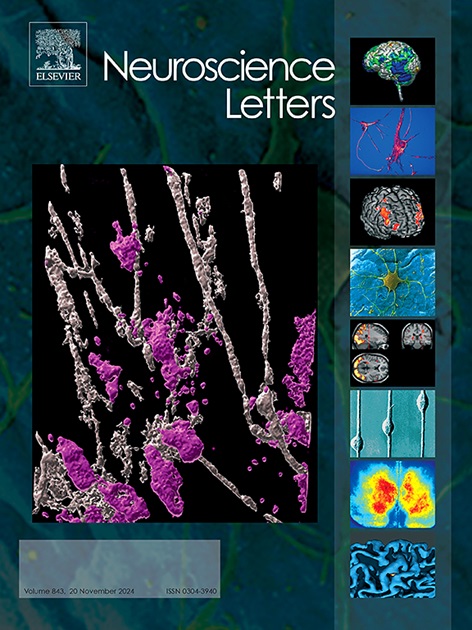将催产素与尼古丁依赖联系起来:一项关于老鼠大脑、行为和肠道微生物群的实验研究。
IF 2
4区 医学
Q3 NEUROSCIENCES
引用次数: 0
摘要
催产素(OXT)是一种下丘脑神经肽,大量研究表明,暴露于成瘾物质,如阿片类药物、可卡因等,可导致OXT系统功能下降。该研究还发现,OXT可以减少对某些药物的成瘾行为,包括甲基苯丙胺、酒精和可卡因,这表明OXT系统与药物滥用之间存在密切关系。虽然尼古丁是烟草中的主要成瘾性物质,但其与OXT系统的相互作用尚不清楚,需要进一步研究。因此,采用酶联免疫吸附试验(ELISA),通过慢性尼古丁缓释泵给药,测量了与成瘾相关的血浆和大脑区域的OXT水平。此外,通过尼古丁自给药实验、开放场实验和16S测序实验,考察OXT注射液对大鼠尼古丁自给药行为、运动活性和肠道微生物群的影响。本研究通过口服抗生素消耗肠道菌群,探讨肠道菌群是否介导催产素对大鼠尼古丁自我给药行为的影响。本研究表明,长期给药尼古丁可降低血浆和脑区(如室旁核(PVN)、腹侧被盖区(VTA)和尾状壳核(CPU))的氧氧t水平。1.0 mg/kg剂量的OXT显著降低了大鼠的尼古丁输注次数和乳酸杆菌的丰度。值得注意的是,我们的研究结果表明,除肠道微生物外,外周OXT给药对尼古丁自我给药的抑制作用还涉及其他机制。本文章由计算机程序翻译,如有差异,请以英文原文为准。
Linking oxytocin to nicotine dependence: An experimental study of the brain, behavior, and gut microbiota in rats
Oxytocin (OXT) is a hypothalamic neuropeptide, and numerous studies have indicated that exposure to addictive substances, such as opioids, cocaine, etc., can result in decreased function of the OXT system. The study also found that OXT can reduce addictive behavior for certain drugs, including methamphetamine, alcohol, and cocaine, suggesting a close relationship between the OXT system and drug abuse. Although nicotine is the main addictive substance in tobacco, its interaction with the OXT system is unknown and requires further study. Therefore, OXT levels in plasma and brain regions associated with addiction were measured by enzyme-linked immunosorbent assay (ELISA) using chronic nicotine administration via a slow-release pump. In addition, the effects of OXT injection on nicotine self-administration behavior, motor activity, and intestinal microbiota in rats were examined by nicotine self-administration experiment, open field experiment, and 16S sequencing experiment. By depleting gut microbiota with oral antibiotics, this study aims to investigate whether gut microbiota mediates oxytocin effect on the nicotine self-administration behavior in rats. This study shows that chronic nicotine administration can reduce OXT levels in plasma and brain regions such as the paraventricular nucleus (PVN), ventral tegmental area (VTA), and caudate putamen (CPU). OXT at a dose of 1.0 mg/kg significantly reduced the number of nicotine infusions and the abundance of Lactobacillus in rats. Notably, our findings indicate that other mechanisms besides gut microbes are involved in the effect of peripheral OXT administration on the inhibition of nicotine self-administration.
求助全文
通过发布文献求助,成功后即可免费获取论文全文。
去求助
来源期刊

Neuroscience Letters
医学-神经科学
CiteScore
5.20
自引率
0.00%
发文量
408
审稿时长
50 days
期刊介绍:
Neuroscience Letters is devoted to the rapid publication of short, high-quality papers of interest to the broad community of neuroscientists. Only papers which will make a significant addition to the literature in the field will be published. Papers in all areas of neuroscience - molecular, cellular, developmental, systems, behavioral and cognitive, as well as computational - will be considered for publication. Submission of laboratory investigations that shed light on disease mechanisms is encouraged. Special Issues, edited by Guest Editors to cover new and rapidly-moving areas, will include invited mini-reviews. Occasional mini-reviews in especially timely areas will be considered for publication, without invitation, outside of Special Issues; these un-solicited mini-reviews can be submitted without invitation but must be of very high quality. Clinical studies will also be published if they provide new information about organization or actions of the nervous system, or provide new insights into the neurobiology of disease. NSL does not publish case reports.
 求助内容:
求助内容: 应助结果提醒方式:
应助结果提醒方式:


